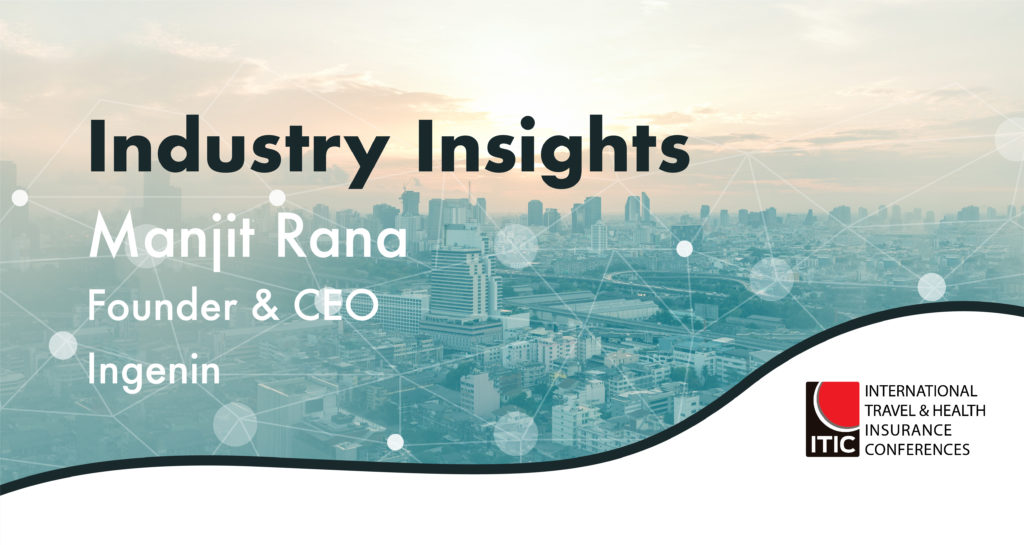
In our latest ITIC Industry Insights, we hear from Manjit Rana, Founder and CEO of Ingenin. Manjit is an insurtech and insurance innovation expert who has graced the stage at ITIC numerous times over recent years, sharing ways our industry can adopt new approaches.
At a time when connecting face-to-face isn’t as simple as we are used to, we have been taking the opportunity to catch up with members of our ITIC community, to find out how they are navigating the current crisis. You can read previous insights here: Eva Kluge, Dexter Tan, Carlos Salinas, Bettina Vadera, Women in Travel Insurance (WITI)
Q: How have you adapted to working from home? Where are you today?
My pre-Covid days used to consist of either commuting from Nottingham to London, about a 2.5-hour commute each way for a day filled with face-to-face meetings, or I would be travelling to conferences or client meetings all over the world.
The last few months have changed this quite considerably. I no longer have the 5-hour daily commute and the extortionate train fares, but my days are still filled with face-to-face meetings – now they are via video calls from home. Thinking back, I reckon I’ve only had 3 or 4 non-video calls, as everyone seems to have become pretty comfortable jumping onto a video call.
It does make you wonder why we all used to wait weeks on end to arrange a face-to-face meeting when now we can typically connect via video call within the same week.
Q: What are the major issues pertaining to your country as a result of the virus?
I’m in the UK and I think we have the highest number of deaths in Europe; and even our death rate per million puts us number 1 globally. Whilst most people took the lockdown seriously for the first 6 weeks or so, I think the frustration started seeping in and most people, particularly the younger generation, are getting desperate to get back to a sense of normality.
It’s been interesting to see how employers have also adapted their businesses and their employee welfare thinking. We are now seeing regular team Zoom calls to keep everyone updated on what’s happening in the business, to team activities such as online quizzes and games; some companies are even sending snack boxes to their employees at home.
I imagine it must be really tough for single people living in one-bedroom apartments in major cities like London or New York where a lot of their social lives revolved around their WeWork community.
Q: How has the coronavirus pandemic impacted your products and services to date?
We are a consultancy business so most of our services are generally based around listening, talking and thinking, and we’ve realised that we don’t have to be in an office to do that. When the lockdown was first announced, a number of our consultancy contracts were put on hold. It was not too worrying as we thought the lockdown would most likely only last a few weeks.
But, like most entrepreneurial people, we looked for the opportunities in the situation and quickly found new consultancy contracts. I’m probably working longer hours now but not spending the 5 hours commuting. I am missing the international travel, the socialising and the hugs from close friends.
Q: What do you think the future of the travel industry will look like?
I think the whole Covid situation has made people realise that video meetings are just as effective as in-person meetings. The issues with bad connections, not being able to connect, have pretty much gone away. Insurers have been forced to implement remote claims assessment tools or digital services at a rapid pace and realised they can overcome the issues when they don’t have the option of traditional ways of working as a safety net.
I feel companies will expect their staff to think twice before agreeing to travel for face-to-face meetings, thereby impacting the number of business trips that are made.
Thinking back to last year, most of my international trips were to attend conferences. Most people are now regularly attending webinars, which they can attend for an hour during the day or watch at their convenience at a later date … and they are free!
You have to wonder how the conference companies will persuade business people to take several days out and the expense of attending international conferences, which will further impact the airlines.
With the number of people that have either lost their jobs, are worried about losing their jobs or have been furloughed, you have to wonder how many of them will want to take holidays abroad, especially long-haul flights.
Travelling whilst wearing facemasks, I think, will also make people think twice about travelling abroad.
All this is bound to put added pressure on airlines, retail outlets at airports and, if there are less people travelling, I guess there will be less people buying travel insurance and also not as many people requiring emergency medical assistance, so I think the rest of this year and 2021 is probably going to be pretty tough financially for most businesses associated with the travel industry.
For the more entrepreneurial businesses out there with strong balance sheets, it’s an opportunity to grow their businesses through buying up the businesses that are in trouble ready for when the market picks up again.
Q: Looking to a time when we can meet face-to-face once again, can you tell us what you enjoy most about the International Travel & Health Insurance Conferences?
I think like most conferences that I attend, for me the most valuable and interesting part is the networking. The ITIC conferences have always been a great place to catch up with industry colleagues that I may not have seen for a while and making new friends. I think that is the aspect that will be tough to replace with online-only services, although I am already starting to see creative entrepreneurs combining gaming and virtual reality platforms to create virtual worlds where your virtual twin or avatar attends. It will be interesting to see how those platforms evolve – at least it’ll be your virtual twin waking up with a hangover rather than the real you after the late-night party.

Manjit Rana – Founder & CEO, Ingenin
Stay connected and join our conversation
